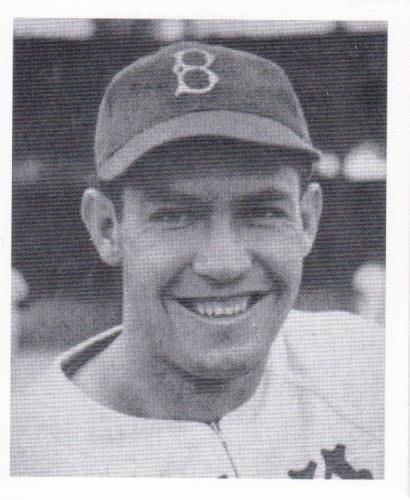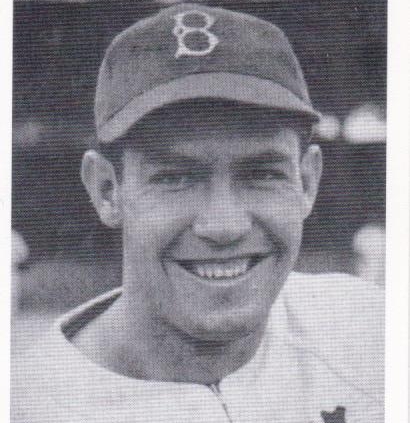July 4, 1948: Dodgers beat Giants in Fourth of July fireworks
 The 28,770 holiday fans who filed into Ebbets Field on the Fourth of July in 1948 came to watch the Brooklyn Dodgers play their crosstown rival, the New York Giants. Some may have planned to watch fireworks that evening after the game. Little could they have suspected that they were about to see an early fireworks exhibition that afternoon.
The 28,770 holiday fans who filed into Ebbets Field on the Fourth of July in 1948 came to watch the Brooklyn Dodgers play their crosstown rival, the New York Giants. Some may have planned to watch fireworks that evening after the game. Little could they have suspected that they were about to see an early fireworks exhibition that afternoon.
The first two innings provided only a hint of what was in store for fans later in the game. With two outs in the bottom of the first inning, Dodgers center fielder Gene Hermanski laced a triple to center field but was stranded when the next hitter, George Shuba, popped out to the Giants catcher. The Dodgers added two more singles in the second, but again were unable to score. The best the Giants could do during those opening frames was a walk in each inning.
The Giants got the scoring started in the third. Struggling with his control, Dodgers pitcher Harry Taylor added three more walks to his account in the third. The first, to pitcher Ray Poat, came with one out. First baseman Whitey Lockman followed the second out with another free pass. With two runners on and two out, Les Layton drove a triple to right field that plated both baserunners. Playing in his only major-league season, Layton was filling in for Bobby Thomson, the Giants’ regular left fielder. Layton had been used exclusively as a pinch-hitter until three days earlier, when he replaced Thomson. After five more consecutive starts, Layton would start only a half-dozen more games at the end of the season. In 1949 he was back in the minor leagues, where his professional baseball career ended six years later.
Pee Wee Reese led off the Dodgers third with a double to left field and was bunted to third base by Jackie Robinson. With Reese lurking off the base, the Giants pitcher, Poat, balked while delivering his first pitch to Hermanski. The pitch drilled the Dodgers center fielder in the hip. The balk brought Reese in with the Dodgers’ first run. Misinterpreting the call, Dodgers manager Leo Durocher leaped out of the dugout ready to do verbal battle with home-plate umpire Scotty Robb until he recognized that the call had gone in his favor. Instead, Giants catcher Walker Cooper complained about the balk call with no success. When the inning ended the Giants’ two-run lead had been cut in half.
The top of the fourth looked like the top of the third. Dodgers pitchers again walked three and gave up a triple. This time, however, the triple came after the first walk. A groundout and another walk later, Taylor was lifted in favor of southpaw Paul Minner, who issued the third free pass of the inning before getting the third out.
As the game began to heat up, the Dodgers’ rookie catcher, Roy Campanella, came to the plate in the fourth with Carl Furillo, who had singled, on first and two outs. Campanella had started the season in Brooklyn but was sent back to the Dodgers’ Triple-A affiliate in St. Paul in late April. Branch Rickey had hoped to make an outfielder out of Campanella and, ostensibly, sent him to the minors to learn the position. However, the underlying reason for the move was to integrate the St. Paul team. Rickey promised Campanella and Durocher, who was not happy about the arrangement, that Campy would return to the Dodgers sometime in midseason. That time had come two days earlier, on July 2. Since then the Dodgers’ new starting catcher had been pounding the ball. In eight official trips to the plate, he had seven hits, including a second-inning single. His onslaught continued in his second at-bat. This time it was his first major-league home run, a two-run shot to left field that tied the game.
The Giants wasted little time in retaking the lead. Johnny Mize led off the fifth with a bunt single and Walker Cooper followed with a single to right. Mize moved to third on a groundout, and scored on Sid Gordon‘s line-drive out to left field. Shortstop Jack Conway followed with a single that plated the second Giants run of the inning. Conway, who was filling in for the Giants’ regular shortstop, Buddy Kerr, went to second when left fielder Shuba misplayed the ball. Two days earlier, Kerr had been hit in the left cheekbone on a throw by Campanella during a steal attempt. The throw knocked Kerr out, but there were no broken bones (though Kerr still suffered from nausea on this day). Conway’s base hit ended the day for Minner, who was replaced by knuckleballer Willie Ramsdell.
The bottom of the fifth began with the end of Durocher’s day. Unhappy with home-plate umpire Robb’s strike zone, Durocher, who had been barking at the umpire throughout the game, confronted him while leadoff hitter Reese was at the plate. A few minutes later, the Dodgers manager was gone. After Durocher’s exit, Poat set down the three Dodgers batters he faced.
The Giants added three runs to their lead in the top of the sixth. They scored after three more walks, a muffed tag by Reese on a steal attempt, and a bases-loaded triple by Willard Marshall, the Giants’ third three-bagger of the day. Now up by five runs, Poat, in the bottom of the inning, again cut through the Dodgers hitters, giving up only a double to Bruce Edwards.
An inning later, Poat was not as successful. With two outs, the Giants pitcher gave up singles to Reese and Robinson. Hermanski followed with a double that scored Reese. Andy Hansen replaced Poat on the mound and on his first pitch, Robinson stole home on the front end of a double steal. Giants catcher Walker Cooper recognized that he could not get Robinson, so instead threw to third to get Hermanski. The throw caught third baseman Sid Gordon by surprise and the ball bounded into left field, enabling Hermanski to score the Dodgers’ third run of the inning. A single and a walk later, Hansen turned the ball over to Larry Jansen, who got the third out.
Hank Behrman, the Dodgers’ fourth pitcher of the day, put down the Giants in order in the top of the eighth. In the bottom of the inning, the Dodgers continued what they had begun the previous inning. Gil Hodges led off with a double and one out later Arky Vaughan, batting for Behrman, doubled Hodges home. Pee Wee Reese followed with a single and Jackie Robinson beat out a bunt to load the bases. Dave Koslo replaced Jansen and walked the tying and go-ahead runs across the plate. Alex Konikowski, the Giants’ fourth pitcher, was called in to get the final two outs.
Once again the Giants wasted no time getting the lead back. Ralph Branca, who was given the responsibility for closing out the Giants in the ninth inning, served up a game-tying home run to the first hitter he faced, Willard Marshall. One out later, Jack Conway reached base on a throwing error by third baseman Eddie Miksis. Bobby Thomson, batting for the pitcher, followed with a single to center. Bill Rigney then stepped to the plate and smacked a three-run shot deep into the left-field stands. It was Branca’s last pitch of the day. Erv Palica got the Dodgers out of the inning.
Giants reliever Monty Kennedy took over for Konikowski in the bottom of the inning. With their team again down by three runs, some Dodgers fans left for home and missed the afternoon’s explosive grand finale. Gil Hodges led off with a single to left. The next hitter, catcher Campanella, worked the count full, then unloaded his second home run of the day, pulling the Dodgers within a run of the Giants. Sheldon Jones replaced Kennedy on the mound and was greeted with a sharp single by right fielder Dick Whitman. Jones then walked Reese and gave up a perfectly placed bunt single to Robinson to load the bases. The next scheduled hitter was pitcher Palica, but he was pulled in favor of Pete Reiser, the 37th player in the game. The Reiser who faced Jones was not the same one who six years earlier had established himself as one of the best players in the game. Broken bones, badly sprained and torn muscles, and at least three concussions from chasing fly balls into outfield walls had drained much of the greatness out of Reiser. Only a day earlier, he had visited the hospital for treatment on two badly sprained ankles. Used primarily as a pinch-hitter in 1948, he came to the plate hitting below .200. After fouling off three pitches, Reiser drilled a bullet into right field. Whitman easily scored the tying run with Reese and the winning run right behind him.
After Reiser’s game-winner, exhausted fans headed home. As they left, some anticipated another fireworks celebration that night, but they all remembered the fireworks they had seen that afternoon.
SOURCES
The author consulted Baseball-Reference.com, Retrosheet.org, SABR.org, and the following:
Lanctot, Neil. Campy: The Two Lives of Roy Campanella (New York: Simon and Schuster, 2011).
McGowen, Roscoe. “Dodgers Count Four Times in 9th to Overcome Giants,” New York Times, July 5, 1948: L-10.
Young, Dick. “Dodgers Edge Giants, 13-12, with 4 in 9th,” New York Daily News, July 5, 1948: 41-42.
Additional Stats
Brooklyn Dodgers 13
New York Giants 12
Ebbets Field
Brooklyn, NY
Box Score + PBP:
Corrections? Additions?
If you can help us improve this game story, contact us.


